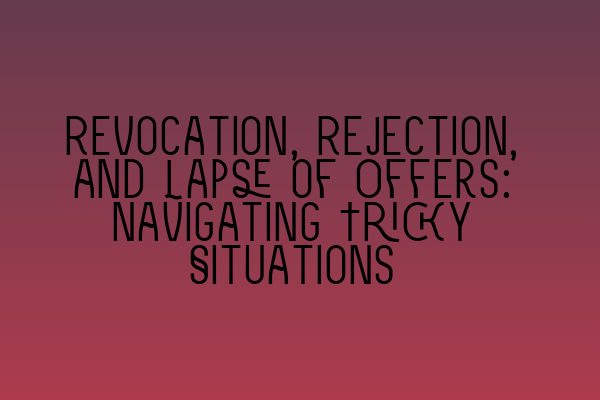Revocation, Rejection, and Lapse of Offers: Navigating Tricky Situations
In contract law, the process of making an offer is an essential element in forming a legally binding agreement. However, there are instances where offers may be revoked, rejected, or may simply lapse. Understanding these situations is crucial for both solicitors and clients to navigate potential pitfalls and ensure the smooth execution of contractual arrangements. In this article, we will delve into the intricacies of revocation, rejection, and lapse of offers, providing you with valuable insights on how to handle such tricky situations.
Let’s start by discussing offer revocation. Revocation refers to the act of retracting or withdrawing an offer before it has been accepted. It is important to note that revocation of an offer is only valid if it is communicated to the offeree before acceptance. This means that a mere change of mind by the offeror does not automatically revoke the offer; the offeror must take action to communicate the revocation to the offeree.
When faced with the revocation of an offer, the offeree may be left with a sense of uncertainty. However, it is essential to remember that revocation does not automatically invalidate the offer altogether. If the offeree becomes aware of the revocation before accepting the offer, the offer is deemed terminated. However, if the offeree accepts the offer before being notified of the revocation, a valid contract is formed, and the revocation becomes ineffective.
On the other hand, rejection of an offer occurs when the offeree explicitly refuses to accept the terms of the offer. Rejection can be communicated through various means, including words, conduct, or inaction. It is important for both offerors and offerees to understand that rejection terminates the offer, and the offeror is no longer bound by the terms of the original offer.
In some cases, an offer may simply lapse. Lapse occurs when an offer is terminated due to the passage of time or the occurrence of a specific event mentioned in the offer. For example, if an offer specifies that it will expire after a certain date, the offer will automatically lapse if it is not accepted by that deadline. Similarly, if an offer is contingent upon a particular event, such as the sale of a property, and that event does not occur within the specified timeframe, the offer will lapse.
Navigating tricky situations involving offer revocation, rejection, and lapse requires careful consideration and knowledge of contract law principles. As a solicitor, it is your responsibility to guide your clients through the complexities of these situations and protect their interests. By staying up to date with the latest legal developments and providing accurate advice, you can ensure that your clients are well-prepared to handle any challenges that may arise.
To further enhance your understanding of contract law and prepare for the SQE exams, we recommend exploring our comprehensive SQE 1 Practice Exam Questions and SQE 1 Practice Mocks FLK1 FLK2. These resources will allow you to test your knowledge and familiarize yourself with the type of questions you may encounter in the exams.
In addition to contract law, it is essential to have a solid understanding of other areas of law to effectively serve your clients. Our SQE 2 Preparation Courses and SQE 1 Preparation Courses offer in-depth coverage of key legal topics, equipping you with the skills necessary to excel in your professional journey.
Lastly, it is important to stay informed about the latest SRA SQE Exam Dates to ensure that you stay on track with your exam preparations and meet all the necessary requirements.
Revocation, rejection, and lapse of offers are indeed tricky situations that can pose challenges for both solicitors and clients. However, by staying knowledgeable, providing sound advice, and utilizing the available resources, you can successfully navigate these complexities and secure favorable outcomes for your clients.
Related Articles:
– SQE 1 Practice Exam Questions
– SQE 1 Practice Mocks FLK1 FLK2
– SQE 2 Preparation Courses
– SQE 1 Preparation Courses
– SRA SQE Exam Dates
